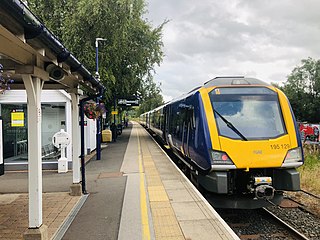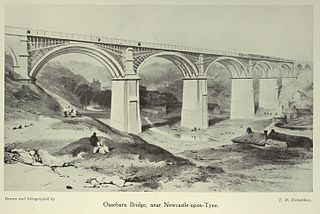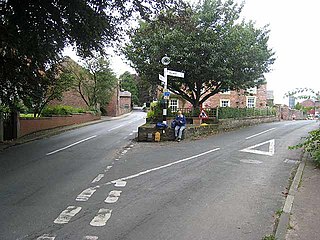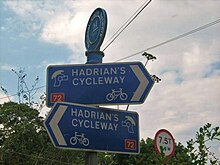
Cumbria is a ceremonial county in North West England, bordering Scotland. It came into existence in 1974 after the passage of the Local Government Act 1972. In April 2023, its county council was abolished and all of its administrative functions were taken over by Westmorland and Furness and Cumberland. Cumbria's largest settlement is Carlisle and other major settlements include Barrow-in-Furness, Kendal, Whitehaven and Workington.

The National Cycle Network (NCN) was established to encourage cycling and walking throughout Britain, as well as for the purposes of bicycle touring. It was created by the charity Sustrans who were aided by a £42.5 million National Lottery grant. However Sustrans themselves only own around 2% of the paths on the network, these rest being made of existing public highways and rights of way, and permissive paths negotiated by Sustrans with private landowners, which Sustrans have then labelled as part of their network.
The Coast to Coast or Sea to Sea Cycle Route (C2C) is a 140 miles (230 km) cycle route opened in 1994. Combining sections of National Cycle Route 7, 14, 71 and 72; it runs from Whitehaven or Workington on the west coast of Cumbria, and then crosses the Lake District and the Pennines in the north of England by using a variety of both on and off-road trails, ending on the north-east coast in Tyne and Wear at Sunderland or Tynemouth. Sustrans state that it is the UK's most popular challenge cycle route, it is designed for the whole range of cyclists, from families to cycling club riders. Although a challenge with some hard climbs—the highest point being over 609 m (1,998 ft)—the C2C is completed by an average of between 12,800 and 15,000 cyclists every year.

The A590 is a trunk road in southern Cumbria, in the north-west of England. It runs north-east to south-west from M6 junction 36, through the towns of Ulverston and Barrow-in-Furness to terminate at Biggar Bank on Walney Island. The road is a mixture of dual carriageway and single carriageway, with the section east of Low Newton, Cumbria to the M6 being mainly dual. Further dual sections are south of Newby Bridge, south of Greenodd and south of Ulverston. The road is the main route for tourists entering the southern Lake District. It has often humorously been described as "the longest cul-de-sac in the world".

Ravenglass is a coastal village in Cumberland, Cumbria, England. It is between Barrow-in-Furness and Whitehaven. Historically in Cumberland, it is the only coastal village in the Lake District National Park. It is located at the estuary of three rivers: the Esk, Mite and Irt.

Windermere railway station serves Windermere in Cumbria, England. It is just south of the A591, about 25 min walk or a short bus ride from the lake. The station is located behind a branch of the Booths supermarket chain, which occupies the site of the original station building, in front of the Lakeland store. It is the terminus of the former Kendal and Windermere Railway single-track Windermere Branch Line, with a single platform serving one terminal track.

The Cumbrian Coast line is a rail route in North West England, running from Carlisle to Barrow-in-Furness via Workington and Whitehaven. The line forms part of Network Rail route NW 4033, which continues via Ulverston and Grange-over-Sands to Carnforth, where it connects with the West Coast Main Line.
The Walney to Wear and Whitby Cycle Route is the name of a cross-country cycle route in Northern England. It runs from Walney Island in Cumbria to Sunderland on the River Wear or Whitby.

Hadrian's Wall Path is a long-distance footpath in the north of England, which became the 15th National Trail in 2003. It runs for 84 miles (135 km), from Wallsend on the east coast of England to Bowness-on-Solway on the west coast. For most of its length it is close to the remains of Hadrian's Wall, the defensive wall built by the Romans on the northern border of their empire. This is now recognised as part of the "Frontiers of the Roman Empire" World Heritage Site.

Ravenglass is a railway station on the Cumbrian Coast Line, which runs between Carlisle and Barrow-in-Furness. The station, situated 29+1⁄4 miles (47 km) north-west of Barrow-in-Furness, serves the village of Ravenglass in Cumbria. It is owned by Network Rail and managed by Northern Trains.
The Pennine Cycleway is a Sustrans-sponsored route in the Pennines range in northern England, an area often called the "backbone of England". The route passes through the counties of Derbyshire, West Yorkshire, Lancashire, North Yorkshire, Cumbria and Northumberland. It is part of the National Cycle Network (NCN). Sustrans founder John Grimshaw calls it 'the best National Cycle Network route of the lot'.

The Cumbria Coastal Way (CCW) is a long-distance footpath in Cumbria in northern England, following the coast from Silverdale, just over the Lancashire border, to just north of the Anglo-Scottish border. It is now part of the England Coast Path.

The Newcastle & North Shields Railway opened in June 1839 from a temporary terminus in Carliol Square in Newcastle upon Tyne to North Shields. The railway was absorbed by the Newcastle & Berwick Railway in November 1844. The Newcastle & Berwick Railway was itself absorbed by the York, Newcastle and Berwick Railway, and this became part of the North Eastern Railway in 1854.

Ravenglass Roman Bath House is a ruined ancient Roman bath house at Ravenglass, Cumbria, England. Belonging to a 2nd-century Roman fort and naval base, the bath house is described by Matthew Hyde in his update to the Pevsner Guide to Cumbria as "an astonishing survival". The still standing walls are 13 ft high, there are patches of the internal rendering, in dull red and white cement, and traces of the splayed window openings remain.

National Cycle Route 1 is a route of the National Cycle Network, running from Dover to Tain. The 1,264 mi-long (2,034-kilometre) cycle-path is located in the United Kingdom.

Newcastle City Centre is the city centre district of Newcastle upon Tyne, England. It is the historical heart of the city and serves as the main cultural and commercial centre of the North East England region. The city centre forms the core of the Tyneside conurbation.

The Scotswood, Newburn and Wylam Railway was a railway company that built the 6+1⁄2 miles (10.5 km) North Wylam branch or North Wylam loop on the former Newcastle & Carlisle Railway. The loop line opened between 1871 and 1876 and followed the former Wylam waggonway past the cottage where George Stephenson was born. The company was taken over by the North Eastern Railway in 1883.

Kirkandrews-on-Eden or Kirkandrews-upon-Eden, in the past known as Kirkanders, is a village and former civil parish, now in the civil parish of Beaumont, in the Carlisle District of the county of Cumbria, England. The village is found 4 miles North-West of Carlisle. Kirkandrews forms part of the Barony of Burgh together with the nearby villages Monkhill, Grinsdale, Rattlingate and Burgh-by-Sands. The civil parish was merged into Beaumont in 1934. In 1931 the civil parish had a population of 145.
National Cycle Network (NCN) Route 70 is a Sustrans National Route that runs from Walney Island in Cumbria to Sunderland. The route is fully open and signed. From end to end the route is 149 miles (240 km), but two sections are shared with other NCN routes leaving Route 70 at 128 miles (206 km).
The National Cycle Route 725, also known as the Great North Cycleway is a partially-complete regional cycling route that forms part of the National Cycle Network (NCN) in the United Kingdom.

















